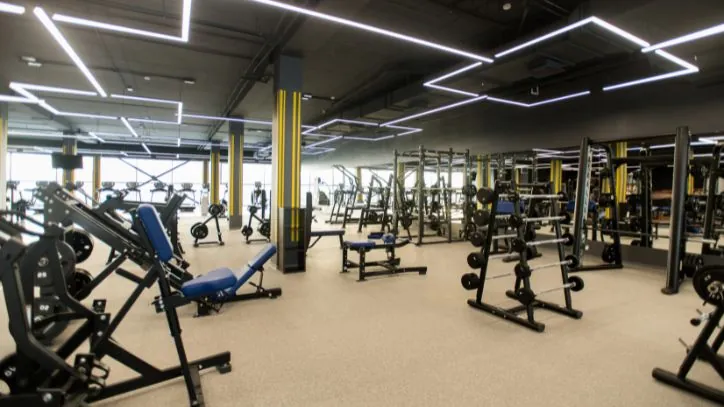Blog
How I’m Using Portion Control, Calorie Counting, and a Deficit to Hit My Fitness Goals


For the past few months, I’ve been on a mission not just to lose weight but to sculpt a leaner, more defined body. There are no crash diets or quick fixes; I’ve tried a few. Instead, what works better is taking a calculated approach focused on portion control, tracking my intake, and ensuring I burn more calories than I consume. The formula is simple, but execution is everything.
Why Caloric Balance Matters
At its core, weight loss and body recomposition boil down to one fundamental rule: calories in versus calories out. If I eat more than I burn, I gain weight. If I burn more than I eat, the weight comes off. This fundamental principle is supported by numerous studies highlighting the importance of caloric balance in weight management. It’s basic math, but making it work in real life means dialing in my nutrition, workouts, and daily habits.
Understanding the workings of your metabolism is crucial. Caloric needs vary based on factors like age, gender, weight, and activity level. The Mifflin-St Jeor equation is an excellent tool for estimating one’s basal metabolic rate (BMR), helping me to calculate the daily calories required for maintenance. This information is beneficial for determining my calorie deficit.
Portion Control Without Starving
One of the biggest changes I made was learning to recognize appropriate portion sizes. It’s easy to overeat when restaurants serve plates meant for two or when my instinct says, “That looks about right.” Learning to manage my portions was crucial. According to the National Institutes of Health, portion sizes have significantly increased over the past few decades, which is a trend that contributes to excessive calorie intake.
Instead of measuring every gram, I use simple techniques like smaller plates, mindful chewing, and loading up on protein to keep me fuller for longer. Research suggests that increasing protein intake can significantly impact overall satiety and lead to lower total calorie consumption throughout the day.
Using smaller plates tricks my brain into feeling satisfied with less food, creating a visual effect of abundance with appropriately sized portions. This psychological aspect of eating is supported by the Delboeuf illusion and can help in maintaining my calorie goals without feeling deprived. I still enjoy the foods I love, but in amounts that support my goals.
Tracking Without Overthinking
Calorie tracking doesn’t have to be obsessive, but it does have to be consistent. I keep it simple with a calorie-tracking app like MyFitnessPal or Lose It!, logging meals with a rough estimate when necessary. Studies have shown that self-monitoring can effectively promote weight loss by helping individuals recognize their eating patterns. I aim for accuracy without letting it take over my day, recognizing that it’s okay to miss a meal or not have precise numbers every single time.
Knowing what goes into my body helps me stay on course and tweak things when progress stalls. Logging my meals also allows me to identify high-calorie pitfalls, helping me make better choices or substitutes as needed. For instance, if I notice that my afternoon snack is often unhealthy, I can brainstorm better alternatives beforehand, like choosing fresh fruits or nuts, which are higher in nutrients and may promote a feeling of fullness.
The Burn: My Workout Strategy
Diet alone isn’t enough—movement is key. My weekly routine includes a mix of weight training, running, cycling, and high-intensity workouts to ensure I’m not just cutting weight but building strength and endurance. Research from the Journal of Applied Physiology has shown that incorporating strength training can positively affect your resting metabolic rate, helping burn more calories even while at rest.
To track my progress, I monitor my calorie burn during workouts with a smartwatch or fitness tracker. Understanding the calories burned during various exercises helps me adjust my intake to ensure I’m creating a sustainable deficit. Some days that means pushing harder in the gym with a heavier weight or longer duration; others, it’s as simple as walking more to keep my activity levels up. Finding that balance between strength work and cardio is essential, as the combination can optimize my fitness outcomes.
I’ve also incorporated flexibility training into my routine. Yoga and stretching play significant roles in recovery and can aid in injury prevention. According to studies, regular stretching and flexibility training can enhance performance and overall physical function.

Making It Sustainable
The real challenge isn’t starting a calorie deficit; it’s maintaining it without burning out. I focus on meal prep, allowing for flexibility for social events, and adjusting my intake based on performance and recovery needs. Sustainable weight loss is about finding habits that are maintainable over the long term.
Some weeks, my deficit is more aggressive; maybe I’ve got an event coming up, or I need to jumpstart my weight loss. During these times, I fine-tune my meal plans and include more nutrient-dense foods to ensure adequate micronutrient intake. Other times, I prioritize maintenance to allow my body to adapt. This flexibility keeps me from feeling deprived. The key is consistency, not perfection.
Taking a mental health break is equally important. If I’m feeling overwhelmed, I give myself permission to take a step back. Whether that means indulging in my favorite dessert occasionally or skipping a workout, it’s vital to prioritize my overall well-being. Research indicates that focusing on mental health can significantly impact physical health outcomes.
The Importance of Accountability
Having a support system is crucial. I find that sharing my goals with friends or family provides me with accountability. Engaging in accountability groups or online communities, including those on platforms like Instagram or Reddit, can offer support from others on similar journeys. Connecting with like-minded individuals creates a sense of camaraderie, motivation, and encouragement.
Tracking my progress helps me stay motivated. I take weekly photos, jot down my workout achievements, and celebrate non-scale victories, such as completing a challenging workout or fitting into clothes better. These milestones remind me of how far I’ve come, rewarding my efforts beyond just seeing a number on the scale.
Nutrition and Meal Prep Made Easy
When it comes to nutrition, meal prep has been a game changer for me. Preparing meals and snacks ahead of time reduces the likelihood of making impulsive food choices when hunger strikes. I dedicate a few hours each week to batch cooking whole grains, proteins, and various vegetables.
Using containers to portion out my meals simplifies my week. The convenience of grabbing a pre-prepared meal prevents the temptation to opt for quick, often unhealthy options. I find that including a variety of colors and textures in my meals not only keeps it visually appealing but also leaves me feeling satisfied and energized.
I make sure to include healthy fats like avocado or nuts, as they can play a crucial role in satiety. Healthy fats are essential for hormonal balance and can even assist with nutrient absorption from other foods, according to Nutrition Reviews. Balancing macronutrients—carbohydrates, proteins, and fats—ensures my meals are satisfying while fueling my workouts and daily activities.
Staying Hydrated
Don’t overlook hydration! Drinking enough water is vital for overall health and aids in weight loss. Sometimes thirst can be mistaken for hunger, leading to unnecessary snacking. Drinking water before meals can help regulate appetite, says the American Journal of Clinical Nutrition.
I try to keep a water bottle handy throughout the day as a reminder to stay hydrated. Herbal teas are also an excellent choice for adding variety to my hydration. They can be flavorful and often contain beneficial antioxidants.
Understanding the Importance of Sleep and Recovery
Lastly, one of the most underrated aspects of weight loss and fitness is recovery, particularly sleep. Sleep plays a vital role in weight management, hormonal health, and overall performance. A study by the Journal of Clinical Endocrinology & Metabolism indicates that insufficient sleep can affect the hormones that regulate appetite and hunger rationally.
To promote better sleep, I prioritize a consistent sleep schedule, limit screen time before bed, and create a calming nighttime routine. The relationship between mental well-being and sleep hygiene is crucial—better sleep can lead to improved mood and energy, making workouts feel more manageable and encouraging adherence to my fitness plans.
Conclusion: Control and Commitment
Portion control, calorie tracking, and movement aren’t magic tricks—they’re tools. Using them has helped me lose weight while keeping my energy and workouts strong. It’s a process that works when I commit to it. This approach isn’t about restriction; it’s about control. And that control? That’s what keeps me moving forward.
While the journey has its ups and downs, I’ve learned to embrace flexibility and compassion towards myself. Fitness isn’t just about a number on a scale—it’s about finding joy in movement, nourishing my body, and growing stronger over time. The power of adapting my habits to fit my lifestyle has made all the difference, leading me to believe that sustainable weight management can indeed be achieved.
As I continue on this journey, I remain committed to making gradual, lasting changes that enhance my overall health while still allowing for the enjoyment of life’s pleasures. The combination of portion control, calorie counting, and maintaining an active lifestyle allows me to take charge of my body and future, and I’m excited to see w
By Joel Carr, Arizona Farm Bureau Strategic Communications Manager


















